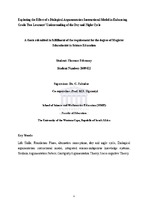| dc.contributor.advisor | Fakudze, C. | |
| dc.contributor.advisor | Ogunniyi, Meshach B. | |
| dc.contributor.author | February, Florence | |
| dc.date.accessioned | 2016-09-22T07:47:32Z | |
| dc.date.available | 2016-09-22T07:47:32Z | |
| dc.date.issued | 2016 | |
| dc.identifier.uri | http://hdl.handle.net/11394/5225 | |
| dc.description | Magister Educationis - MEd | en_US |
| dc.description.abstract | Over the last 15 years the Department of Education has rolled out various projects in an attempt to improve Mathematics and Science results and to increase the amount of learners who exit their schooling with those subjects. The 2010 - 2014 matric results show a decrease in the number of students who exiting with Science. One of the factors that might influence the learners' decision to do science can be ascribed to the methodologies that the teachers are using to teach Science. In response to the latter, this study investigated the cognitive shifts of grade two learners' conceptual knowledge of the day and night cycle after being exposed to a
Dialogical Argumentation Based Instructional Model. The Contiguity Argumentation Theory (CAT) and Toulmin's Argumentation Pattern (TAP) were used as a framework to capture and interrogate learners' arguments with argumentation
frames developed to categorize the learners’ argument responses. Analytical approaches were used to assess learners' argumentation skills along four stages namely intra-argumentation, inter-argumentation, whole class discussion and trans-argumentation. The study employed both quantitative and qualitative methods. The data was collected from grade 2 learners in a primary school in Cape Town, Western Cape Province in the form of a pre-post questionnaire, focus group interviews and classroom observation. The major findings of this study indicated that ● The Dialogical Argumentation Instructional model can assist learners to develop argumentative skills. ● The grade two learners in this study had alternative conceptions regarding the day and night cycle which is not scientifically valid. ● The views that learners hold are egocentric. ● DAIM is an effective teaching strategy to help learners to eliminate the misconceptions This study has shown that the Dialogical Argumentation Instructional Model (DAIM) seems to be effective in enhancing the learners’ understanding of the day and night cycle. | en_US |
| dc.description.sponsorship | National Research Foundation | en_US |
| dc.language.iso | en | en_US |
| dc.publisher | University of the Western Cape | en_US |
| dc.subject | Life skills | en_US |
| dc.subject | Dialogical argumentation instructional model | en_US |
| dc.subject | Science | en_US |
| dc.subject | Indigenous knowledge systems | en_US |
| dc.subject | Contiguity Argumentation Theory | en_US |
| dc.title | Exploring the effect of a Dialogical Argumentation Instructional Model in enhancing grade two learners' understanding of the day and night cycle | en_US |
| dc.rights.holder | University of the Western Cape | en_US |

